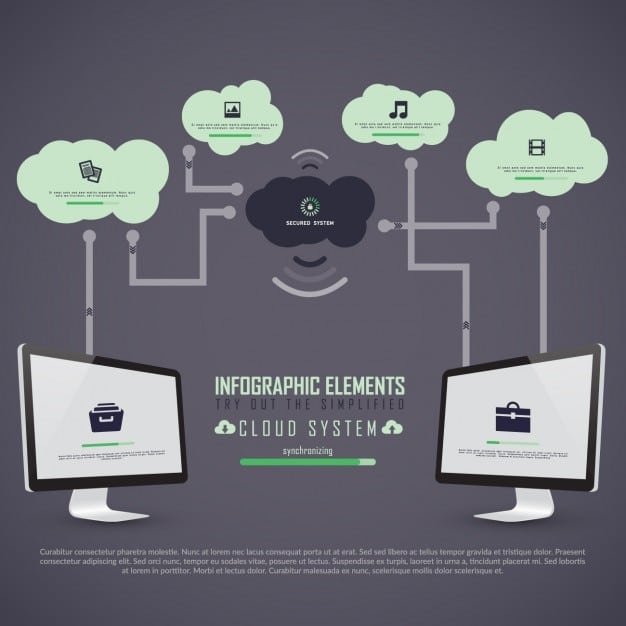The Financial Impact of Cloud Computing on US Small Businesses

Cloud computing offers US small businesses significant financial benefits, including reduced IT costs, increased efficiency, and improved scalability, enabling them to compete more effectively in the digital marketplace.
In today’s digital landscape, small businesses are constantly seeking ways to optimize their operations and reduce costs. The financial impact of cloud computing on US small businesses is substantial, offering a range of benefits that can transform their bottom line. By leveraging cloud-based solutions, these businesses can access enterprise-level technology without the hefty upfront investments, paving the way for greater efficiency and growth.
Understanding Cloud Computing and Its Benefits
Cloud computing has revolutionized the way businesses operate, providing on-demand access to computing resources—servers, storage, databases, networking, software, analytics, and intelligence—over the internet (“the cloud”). This model offers several key advantages for small businesses, mainly in financial efficiency and operational flexibility.
What is Cloud Computing?
Cloud computing essentially means storing and accessing data and programs over the Internet instead of your computer’s hard drive. This eliminates the need for businesses to invest in and maintain their own IT infrastructure.
Key Benefits for Small Businesses
The advantages of cloud computing extend beyond cost savings. They include enhanced collaboration, improved data security, and the ability to scale resources up or down as needed.
- Cost Reduction: Lower IT infrastructure costs and reduced need for in-house IT staff.
- Scalability: Easily adjust resources to meet changing business demands.
- Accessibility: Access data and applications from anywhere with an internet connection.
- Enhanced Security: Benefit from the security measures implemented by cloud providers.
By understanding these core benefits, small businesses can better appreciate the potential financial impact of migrating to the cloud. This initial understanding is crucial for making informed decisions about technology investments.

Direct Cost Savings Through Cloud Adoption
One of the most immediate and noticeable financial benefits of cloud computing is the direct reduction in IT-related expenses. These savings come from various sources, including lower hardware costs and reduced energy consumption.
Reduced Hardware Costs
Small businesses no longer need to invest in expensive servers, storage devices, and networking equipment. Cloud providers handle the infrastructure, significantly lowering capital expenditures.
Lower Energy and Maintenance Costs
With the cloud, businesses avoid the costs associated with powering and cooling on-site servers. Maintenance and updates are also managed by the cloud provider, freeing up internal resources and reducing labor costs.
- Elimination of Upfront Investments: No need to purchase expensive hardware or software licenses.
- Reduced IT Staffing Costs: Lower demand for in-house IT personnel to manage infrastructure.
- Predictable Monthly Expenses: Subscription-based pricing models allow for better budgeting and financial planning.
These direct cost savings can have a significant impact on a small business’s cash flow, allowing them to reinvest in other areas of the business.
Increased Efficiency and Productivity
Beyond direct cost savings, cloud computing enhances efficiency and productivity. Cloud-based applications and services streamline business processes, enabling employees to work more effectively.
Improved Collaboration
Cloud-based collaboration tools facilitate seamless communication and teamwork, regardless of location. This leads to faster decision-making and improved project outcomes.
Automation of Tasks
Many cloud-based solutions automate routine tasks, such as data backup and software updates, freeing up employees to focus on more strategic initiatives.

- Faster Deployment of Applications: Cloud services allow businesses to quickly deploy new applications and services.
- Enhanced Business Agility: The ability to quickly adapt to changing market conditions.
- Better Resource Allocation: Optimize resource allocation based on real-time business needs.
By increasing efficiency and productivity, cloud computing helps small businesses achieve more with fewer resources, leading to higher profitability.
Scalability and Flexibility for Growth
Scalability is a critical benefit, especially for growing small businesses. Cloud computing allows businesses to easily scale their resources up or down as needed, without the constraints of physical infrastructure.
On-Demand Resource Allocation
Businesses can quickly adjust their computing resources to meet changing demands, whether it’s adding more storage space or increasing processing power. This flexibility ensures that businesses can handle peak loads without investing in excess capacity.
Support for Remote Work
Cloud computing enables remote work by providing employees with access to the tools and data they need from anywhere. This can lead to increased employee satisfaction and reduced overhead costs associated with office space.
Scalability and flexibility are essential for long-term growth, allowing small businesses to adapt to changing market conditions and capitalize on new opportunities.
Enhanced Data Security and Disaster Recovery
Data security is a top concern for all businesses, regardless of size. Cloud providers invest heavily in security measures to protect their customers’ data, often providing better security than small businesses can achieve on their own.
Advanced Security Measures
Cloud providers employ various security measures, including encryption, firewalls, and intrusion detection systems, to protect data from unauthorized access.
Reliable Disaster Recovery
Cloud-based disaster recovery solutions ensure that businesses can quickly recover their data and applications in the event of a disaster. This minimizes downtime and prevents data loss, ensuring business continuity.
- Data Encryption: Protecting sensitive data with encryption both in transit and at rest.
- Regular Security Audits: Cloud providers undergo regular audits to ensure compliance with industry standards.
- Automated Backups: Regular backups ensure that data can be quickly restored in the event of a failure.
By leveraging the security expertise and infrastructure of cloud providers, small businesses can enhance their data security and protect themselves from costly data breaches.
Strategic Advantages and Competitive Edge
Beyond the direct financial benefits, cloud computing provides strategic advantages that can help small businesses compete more effectively. These advantages include access to advanced technologies and the ability to innovate more quickly.
Access to Advanced Technologies
Cloud computing provides access to advanced technologies, such as artificial intelligence and machine learning, that were previously only available to large enterprises. This enables small businesses to innovate and develop new products and services.
Faster Innovation
The cloud enables faster innovation by providing a platform for experimentation and rapid prototyping. Businesses can quickly test new ideas and bring them to market faster.
- Improved Customer Service: Cloud-based CRM systems enable businesses to provide better customer service.
- Data-Driven Decision Making: Cloud-based analytics tools provide insights that can inform business decisions.
- Enhanced Collaboration with Partners: Cloud computing facilitates seamless collaboration with partners and suppliers.
By leveraging these strategic advantages, small businesses can gain a competitive edge and position themselves for long-term success.
| Key Point | Brief Description |
|---|---|
| 💰 Cost Reduction | Lower IT costs, reduced hardware expenses. |
| 🚀 Scalability | Easily adjust resources to meet demands. |
| 🔒 Security | Enhanced data protection measures. |
| 📈 Efficiency | Improved productivity through automation. |
Frequently Asked Questions
▼
Cloud computing eliminates the need for costly hardware and reduces the expenses associated with maintaining an in-house IT infrastructure, such as electricity and IT staff salaries.
▼
Yes, reputable cloud providers invest heavily in security measures, including encryption, firewalls, and regular audits, to protect data from unauthorized access and cyber threats.
▼
Cloud computing allows businesses to easily scale their resources up or down as needed, ensuring they can handle peak loads and adapt to changing business requirements without overspending.
▼
There are three main types of cloud computing services: Infrastructure as a Service (IaaS), Platform as a Service (PaaS), and Software as a Service (SaaS), each offering different levels of control and flexibility.
▼
Cloud-based collaboration tools enable employees to easily share files, communicate, and work together in real-time, regardless of their location, leading to improved productivity and teamwork.
Conclusion
The financial impact of cloud computing on US small businesses is undeniable. By embracing cloud solutions, these businesses can significantly reduce costs, improve efficiency, enhance security, and gain a competitive edge in the digital marketplace. As cloud technology continues to evolve, its role in empowering small businesses will only become more crucial.





